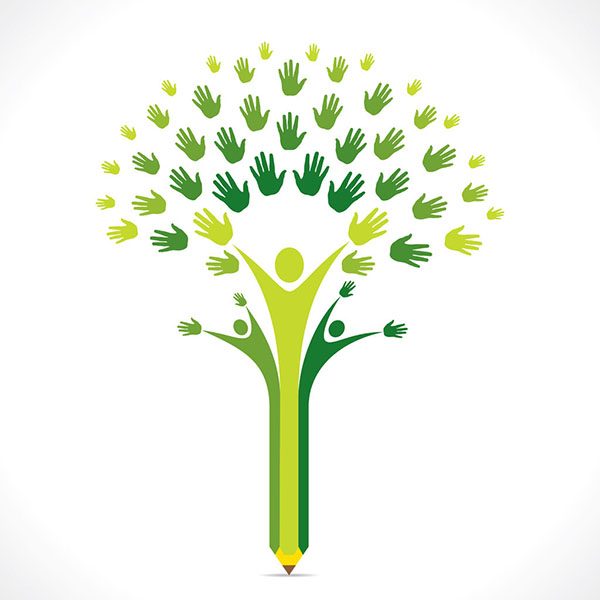Awards
Coalition for Community Writing awards are given at the biennial Conference on Community Writing™ in the categories of:
Distinguished Engaged Scholar in Community Writing Award
The Distinguished Engaged Scholar in Community Writing Award is presented to an individual who has made a significant contribution to community writing, which includes scholarship areas such as service-learning, community-based research, community literacy, ethnography, community publishing, advocacy, and activist writing. The nominee should be a practitioner-scholar who could be a college faculty member, teacher, or administrator with a publishing record on community writing. Nominees for this award should clearly demonstrate a sustained and distinguished track record of:
- Writing for and with others, with an impact on the well-being of a region or area
- Using writing to build and sustain networks of advocacy and support across institutional boundaries such as schools, colleges, neighborhood centers, non-profits, or government agencies
- Innovating new methods of organizing and fostering community writing in diverse and multimodal contexts
- Fostering reciprocal and culturally sensitive projects that “write community”—strengthening social, economic, and cultural bonds constitutive of healthy local or advocacy groups.
Previous award winners include:
- 2022: Paula Mathieu
- 2021: Beverly Moss
- 2020: Dr. Steve Parks
- 2019: Dr. Elaine Richardson
- 2017: Ellen Cushman
- 2015: Eli Goldblatt
Outstanding Book in Community Writing
The Outstanding Book Award is presented for the most outstanding book in community writing, which includes the areas of service learning, community-based research, community literacy, ethnography and memoir, community publishing, advocacy, and activist writing. Eligible books will be situated within the broad, historical traditions of rhetoric and composition, literacy studies, and related disciplines and should substantially draw on and/or contribute to scholarship about, for, with, and by local or global communities. The award committee will consider both print and digital monographs, as well as edited collections.
Previous award winners include:
- 2023: Laura Gonzales’ Designing Multilingual Experiences in Technical Communication
- 2023: V. Jo Hsu’s Constellating Home: Trans and Queer Asian American Rhetorics
- 2021: Rachael Wendler Shah’s Rewriting Partnerships
- 2021: April Baker-Bell’s Linguistic Justice
- 2021: Aja Martinez’s Counterstory
- 2019: Dr. Steven Alvarez’s Brokering Tareas: Mexican Immigrant Families Translanguaging Homework Literacies
- 2019: Dr. Patrick Berry’s Doing Time, Writing Lives: Refiguring Literacy and Higher Education in Prison
- 2019: Dr. Candace Epps-Robertson’s Resisting Brown: Race, Literacy, & Citizenship in the Heart of Virginia
- 2017: Eric Darnell Pritchard’s Fashioning Lives: Black Queers and the Politics of Literacy
Outstanding College-Community Project
The Outstanding College-Community
The initiatives may be short- or long-term, and they may be based on service-learning, community engagement, and/or community-based research models at two- or four-year institutions. They may include undergraduate-, graduate-, faculty-, and administrative-level contributions to the collaboration with the community. Community partners may include individuals, non-profit organizations having a 501(c)3 status (or comparable status), government agencies (e.g. city schools), and for-profit organizations with philanthropic activities.
Submissions for this award should clearly demonstrate the following: 1) a reciprocal partnership in the process of organizing, running, and evaluating the project; 2) commitment to literacy and/or writing; 3) articulation of clear, useful project outcomes and impacts; and 4) a commitment to sustainability of the partnership, the service-learning model, or the community-based research study.
Previous award winners include:
- 2021: Tactical Approaches to Reproductive Justice in Hartford, CT
Megan Faver Hartline, Erica Crowley, Liz Gustafson - 2021 Runner Up: Fostering College Pathways Through Community Writing
Nicole Crevar , Charisse Iglesias, Maxwell Irving - 2019: Herstory College/Community Consortium’s Writing for Peace and Justice: Memoir as a Tool for Action
- 2019: Runner Up: CWP-Fairfield’s Ubuntu Academy for Writing with Refugee-Background and Immigrant Youth
- 2017: Celebrating Simms: The Story Of The Lucy F. Simms School, Virginia
- 2017 Runner Up: Exchange For Change, Florida
Nominations for each award are valid for three years (two conference cycles). A call for nominations goes out in the Spring before each conference. Please check back in Spring 2025 for the next call.

